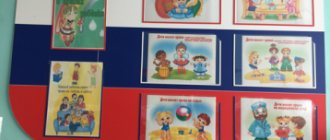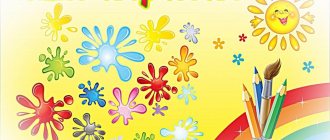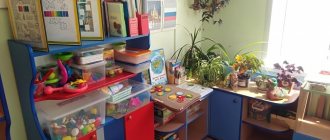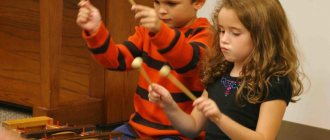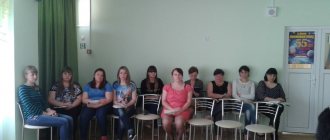An important part of the subject-development environment in the group room is the book corner. This thematic “center of the book” can play a significant role in shaping children’s sustained interest in books, the desire to read, and the need to learn new things.
In the publications presented in this section, teachers share their positive experience of creating beautiful, well-designed and functional book corners, and give useful advice on the aesthetic design of this part of the group’s subject-development environment.
Make the book corner the pride of your group!
Contained in sections:
- Book. All materials on the topic of books 6865
- Corners and centers in groups 6095
Showing publications 1-10 of 254. All sections | Book corner, center. Design examples
New
Photo
The best
Organizing a book corner in the first junior mixed-age group Reading fiction plays an important role in the development of children's cognitive and creative abilities. The main task of introducing preschool children to fiction is to cultivate interest and love for books, the desire to communicate with it, the ability...
Our book corner. Photo report
A book corner is a necessary element of a developing subject environment in a group room of a preschool institution. This is a form of disseminating information about books, their authors and illustrators, helping children get used to the image of a book, arousing interest in it, desire...
Everything for a child's development
Instill a love of books from childhood. Reading, especially paper books, develops imagination and creativity. The task of parents is to create a comfortable reading area for the child, where it will be pleasant to sit down with his mother or alone with his favorite book. Setting up a reading corner at home is easy. You can place it in the children's room or in the common living room where the whole family gathers. Just add a bookcase, armchair or cushion for comfort.
How to organize a reading area
- The place for reading books should be well lit. If there is not enough natural light, install additional lighting fixtures (chandeliers for children's rooms from Aliexpress).
- Make the corner multifunctional so that children can not only read but also play there.
- Make the area fun and attractive for the child with the help of bright colors, unusual decor depicting favorite book characters, and inspiring inscriptions (Aliexpress).
- If you organize a reading corner in a room where the whole family gathers, then it will be used more often.
- Place children's books where they are visible and accessible to the child.
Ideas for decorating a reading corner
Check out the ideas and get inspired to create the perfect book reading nook for your kids' room or living room.
Place pillows or a bean bag chair (Aliexpress) on the floor and your cozy reading corner is ready!
Children love decorative pillows, especially fluffy ones (Aliexpress).
Organize proper storage of books. All books should be visible and the child could get them on his own. For example, using shelves from Aliexpress.
Decorate your reading corner with children's posters (Aliexpress)
Hang a canopy over the chair (Aliexpress) and you will have an ideal area for privacy with your favorite book.
The reading area can be arranged directly on the floor by laying down a warm rug (Aiexpress).
An excellent solution for a reading corner would be a wigwam tent (Aliexpress).
Organize a reading space in your closet or pantry.
WE RECOMMEND: Place the mattress and pillows (Aliexpress) on the rack to create a comfortable place for reading.
If you are the happy owner of wide window sills, then you can arrange a reading corner there.
Use curtains (Aliexpress) to create a secluded place for reading books.
Organize a reading space under the stairs.
A toy house can serve as a place for privacy.
Use the area under the loft bed.
For the more adventurous, create a reading area at the top of the room.
What if there are two children and each wants their own reading corner? There is a solution!
In the summer, organize a reading place outside the city in nature.
Non-standard solutions. Reading books in a hammock (Aliexpress).
WE RECOMMEND ON LABYRINTH.RU:
SIMILAR ARTICLES:
Book corner, center. Design examples - Book corner in an early age group
Publication “Book Corner in the Early Childhood Group...”
In the Rainbow early childhood group, we have created a book corner in which children can independently choose books and calmly look at them. The book corner turned out to be cozy and attractive. It is located away from where children play, so that noisy games do not distract the child, good…
Image library "MAAM-pictures"
Basic requirements for the design of book corners
Fiction reveals to the child the main secret of life - he is not alone in this world: what worries him, cared for his ancestors, worries his contemporaries, will care for his children and grandchildren. A book corner is a necessary element of a developing subject environment in a group...
Book corner of the group “Book corner of the “Romashka” group” V. Sukhomlinsky said: “Reading in childhood is primarily the education of the heart, the touch of human nobility to the innermost corners of a child’s soul.” Preschool childhood is a very important stage in raising an attentive, sensitive reader...
Book corner in the first junior group
A fairy tale is an amazing means of working with the inner world of a person, be it a child or an adult, a powerful tool for development and gaining experience. A fairy tale can help a child get to know the world and understand his own experiences. For a long time, everyday experience has been transmitted through figurative...
Analytical report on the results of the thematic control “Organization of work in the book corner”
| REPUBLIC OF CRIMEA DZHANKOYSKY AREA | REPUBLIC OF CRIMEA DZHANKOYSKY AREA Municipal preschool educational institution "May kindergarten "Solnyshko" | KYRYM DZUMHURIETI JANKOY BOLYUGI |
Pushkin street 56, Mayskoye village, Dzhankoy district, Republic of Crimea, Russian Federation, 296178
tel.:(06564)50-3-08 , e-mail:
Analytical information
based on the results of thematic control
"Organization of work in the book corner"
According to the annual work plan of the MDOU "May Kindergarten "Solnyshko" for the 2022 - 2022 school year, in accordance with Order No. 48-OD dated 02/25/2019 "Organization of work in the book corner", in the period from 03/01/2019 to 03/28/2019 .2019 thematic control was carried out by the senior teacher of the MDOU Popkova I.P.
Target:
to determine the effectiveness of educational work in the May kindergarten "Solnyshko" in introducing fiction to pupils of different age groups; identify causes and factors, analyze the design and content of book corners in all age groups, encourage teachers to update and replenish book corners, adapting their content to new education of a certain age.
Tasks:
— Contribute to the systematization of teachers’ work in the corner of the book.
— Evaluate the joint work of teachers in organizing book corners in groups.
— Identification of advanced pedagogical experience, improvement of the pedagogical skills of teachers.
-Get acquainted with the activities of teachers to attract parents to read fiction.
Control methods:
-Observation and analysis of educational activities for introducing preschoolers to children's fiction;
— Analysis of plans for educational work with children;
— Study of the developing subject-spatial environment.
The “Book Corner” is a necessary element of the developmental subject environment in the group room of a preschool educational institution, which is a means of developing interest and love for fiction in preschoolers. This is a special, specially allocated and decorated place in the group room, where a child can independently, according to his taste, choose a book and calmly examine - “re-read” it. Here the child sees the book not in the hands of the teacher, but is left alone with it. He carefully and intently examines the illustrations, remembers the content, and repeatedly returns to the episodes that excited him. Here there is an intimate, personal communication between a child and a work of art - a book and illustrations. This creates favorable conditions for solving a whole range of educational problems through the means of fiction. A meeting in the “Book Corner” with a familiar work and favorite characters deepens insight into the author’s intention, helps to clarify the images that arose while listening, and once again empathize with the heroes of the event and adventure. By carefully examining the illustrations, the child becomes familiar with the fine arts, learns to see and understand graphic methods of conveying literary content. An illustrated book is also the first art museum where a child directly enters and where he first becomes acquainted with the work of wonderful artists. The purpose of the “Book Corner”
- do not be a bright, festive decoration of a group room, but allow the child to communicate with the book.
There are a number of requirements for organizing a book corner:
• The “book corner” is located, if possible, away from where children play, since noisy games can distract a child from concentrated communication with a book. • The corner should be safe, comfortable, cozy, attractive, conducive to leisurely, concentrated communication with a book. • It is necessary to think about the correct lighting so that children do not spoil their vision: natural (near the window) and electric (the presence of a table lamp, wall sconce) for the evening. • “Book Corner” can be designed in the form of a bookshelf, an open display case where books and albums are stored; and also for this purpose a table and chairs or chairs for it can be specially allocated. The main thing is that the child is comfortable, that everything encourages him to have a leisurely, focused conversation with a book. • The “book corner” should be located so that anyone, even the smallest child, can reach out with his hand and take the book he likes without outside help exactly when he himself wants to do it (not higher than the average height of children of this age group). • Books placed in the book corner should be attractive and aesthetically pleasing. Books must be neatly glued. • It is necessary to exhibit both new, beautiful books and books that have been read for a long time and have been repaired. Used books are sometimes more attractive to the reader simply because it seems to him that a frequently read book should be interesting. • The selection of literature and pedagogical work organized in the “Book Corner” must correspond to the age characteristics and needs of children.
The “Book Corner” is available for all age groups, and the content and placement depend on the age and height of the children. In the early age group
teachers: Dorman O.P., Asanova Z.R., the book corner was not organized right away, since children do not have the skill to use a book, and often they use it as a toy.
First, the teacher introduced the children to the book, looked at the illustrations, read the text, taught them to look at books and pictures only in the designated place, talked about the rules of use (take books with clean hands, leaf through carefully, do not tear, do not crumple, do not draw, do not use for games; after looking at it, always put the book back in its place, etc.), then taught her to use the book independently. The Book Corner displays as many toy books as possible (with moving parts, built-in toys). Preference is given to books - elermans (books whose pages are made of cardboard). As a rule, there are only a few 4-5 books on display. The book corner contains publications well known to children, books with bright illustrations. In addition to books, there are individual pictures pasted on thick paper and small albums for viewing on topics close to children (“Toys”, “Children’s games and activities”, “Pets”, etc.). Looking at albums with object pictures is interesting and important for children learning about the object world at this age. The teacher gives preference to picture books such as “Kolobok”, “Teremok” with illustrations by Yu. Vasnetsov; “Children in a Cage” by S. Marshak with drawings by E. Charushin; stories from L. Tolstoy's ABC with fig. A. Pakhomova; “Confusion”, “Fedorino’s grief” and others by K. Chukovsky from fig. V. Konashevich; “Circus”, “Mustache-striped”, “The Tale of a Stupid Mouse” by S. Marshak with fig. In Lebedeva; “What is good and what is bad?”, “Horse-Fire” by V. Mayakovsky from fig. A. Pakhomova and others. The teacher teaches to carefully look at the pictures in the book, recognize the characters, their actions, encourages them to remember and retell individual episodes. In the mixed age group
(from 3-5 years old) the teacher is Razovaya N.M.
I organized a book corner from the very beginning of the year with the participation of children. There are 5 - 6 books on the display shelves, the rest are stored in the closet. Picture books are used less frequently. The teacher left the children's favorite books from the younger group, adding new fairy tales, poetic works, books about nature, funny books, and added a collection of tongue twisters and tongue twisters. Thematic albums, illustrations are exhibited, and children's drawings on the themes of works of art are also exhibited. On the shelves of the book corner, the teacher displays different types of theater, filmstrips, and a tape recorder with audio cassettes. The teacher draws children's attention to the fact that books wrinkle and tear easily, shows how to care for them, invites them to observe and participate in the repair of books, so material for repairing books (paper, glue, scissors, etc.) is stored there. Contents book corner of the senior group
of preschool educational institutions teacher Vavrinyuk O.N., Belaya L.N.
all their pedagogical work in it is determined by changes in the literary development of children that occur by the age of five. For an older preschooler, a book becomes an important part of spiritual life; he develops literary preferences and expressed individual interests. Some children prefer works about animals to all other books, others are very fond of fairy tales, many boys spend a long time looking at books about war and adventure. The breadth and selectivity of children’s reading interests also determine the main rules for organizing the selection of works—the satisfaction of these diverse interests. In the preparatory group for school,
teachers Filina S.D., Bekirova M., the content of the book corner of these groups becomes more diverse due to genre and thematic diversity.
The number of books increases to 10 - 12 copies. In the preparatory group, books are placed in the book corner:
• books on various topics (each child can find a book according to his desire and taste: stories about the Motherland, war, adventures, animals, about natural life, plants, poems, humorous works, etc. .);
• scientific literature, maps, atlases, encyclopedias. • Folk and original fairy tales; • poems, stories aimed at developing the civic personality traits of a child, introducing him to the history of our homeland, to its life today; • publications of works that children are currently being introduced to in class; • funny books by S. Marshak, S. Mikhalkov, N. Nosov, V. Dragunovsky, E. Uspensky and many other writers with illustrations by our best artists; • illustrations by different artists for the same works; • books that children bring from home; • thematic albums for viewing. These are albums specially created by artists on certain topics (“Different animals” by N. Charushin, “Our children” by A. Pakhomov, etc.), albums compiled by the teacher together with the children from individual postcards and drawings about work, nature in different seasons, books of this or that writer, etc. • portraits of famous children's writers, poets, children's book artists. In the pre-school group, books on school topics have been added.
In order for children to better learn and remember letters, various types of alphabet are placed in the book corner: prose, poetic, artistic.
In the book corner, teachers placed primers and books that children can read themselves from the “Reading by Syllables” series. There is a library in the preparatory group's book corner.
Also in the book corner, the teacher and the children organize thematic exhibitions. Their main goal is to deepen the literary interests of children, to make one or another literary or socially important topic particularly significant and relevant for preschoolers. The theme of the exhibition is necessarily relevant for children (connected with the upcoming holiday, the anniversary of a writer or illustrator, with the content of the planned matinee). The exhibition lasts no more than 3-4 days, because... Children's attention and interest will decrease. Teachers also hold book exhibitions that deepen children’s cognitive interests. In the preparatory group, children can already repair books on their own. Therefore, materials for repairing books are placed in the book corner.
Study of the developing subject-spatial environment
.
An important goal of the modern education system is to educate a person who is identical to himself and carries the image of himself in all the diversity of relationships with the outside world. One of the directions in realizing this goal is to turn to the possibilities of art in the process of education and training. The foundations of personality are laid in preschool age, which, according to A.N. Leontiev, is the period of the initial actual personality structure. Children's books are considered as a means of mental, moral and aesthetic education. Children's poet I. Tolmakova calls children's literature the fundamental basis of education. According to V.A. Sukhomlinsky: “Reading books is the path along which a smart, skillful, thinking teacher finds the way to a child’s heart.”
Fiction forms moral feelings and assessments, norms of moral behavior, and cultivates aesthetic perception. Works of literature contribute to the development of speech and provide examples of the Russian literary language. In stories, children learn laconicism and precision of language; in poetry - musicality, melodiousness, rhythm of Russian speech; fairy tales - accuracy, expressiveness. From the book, the child learns many new words and figurative expressions, his speech is enriched with emotional and poetic vocabulary.
Unfortunately, in recent years there has been a deformation of artistic consciousness, a decline in reading culture, many substitutes have appeared for books: audio, video, television programs, computer programs. They are certainly bright, their impact is active, but they do not require that inner experience, that work of the mind that is natural when reading fiction. Now the pressing question is how to return a book to a child’s hands, how to make a computer an ally of a book.
The book corner in the preschool group room is a quiet area with shelves - a rack for books and a table with chairs for children.
The corners are cozy and attractive for little readers. The corners are decorated with pictures depicting a literary character known to children: the Scientist Cat, who keeps an eye on the books and is always happy to have children. For the center of the book, educational wall newspapers and colorful posters are made; the teacher involves parents and students in their creation (the presence of a “child’s hand” in the design is always pleasant for the children, allowing them to make a feasible contribution to the organization of the group). A wonderful decoration is drawings and plasticine and clay crafts on the theme of literary subjects.
The center of the book is located in a bright place in the groups (it is desirable to have windows on the left and right).
Books, play sets, albums with pictures and illustrations are stored in the book corner with open access to all students.
A separate cabinet contains glue, scissors and paper for repairing books.
In the senior and preparatory groups, the center of the book is fiction that is appropriate for age and topic. Teachers attract children's attention to the design of books and illustrations. Introduce writers and their works.
The development environment has not been completely built. When organizing a subject-spatial environment in a group, complex, multifaceted and highly creative activity of all participants in the educational process is necessary. Further work involves searching for innovative approaches to organizing a subject-development environment in the group, as well as developing parents’ interest in this problem and motivating the desire for interaction.
A rich subject-developmental and educational environment becomes the basis for organizing an exciting, meaningful life and all-round development of each child. The developing subject environment is the main means of shaping the child’s personality and is the source of his knowledge and social experience.
Recommendations:
Based on the above, it is proposed
1. The environment must perform educational, developmental, nurturing, stimulating, organized, and communicative functions.
Responsible: educators Dates: constantly 2. Flexible and variable use of space is necessary. The environment should serve to meet the needs and interests of the child.
Responsible: educators Dates: constantly 5. In each group it is necessary to provide a place for a book corner.
Responsible: educators Dates: constantly
9. The subject-developmental environment of the group should change depending on the age characteristics of the children, the period of study, and the educational program.
Responsible: educators Dates: constantly
The certificate was compiled by senior teacher Popkova I.P.
Head of MDOU Matveeva L.O.
